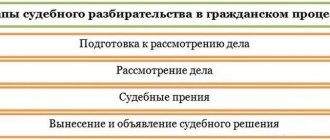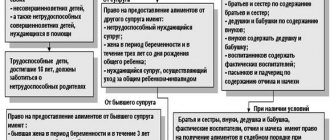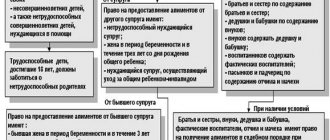Home/Children during a divorce/How to leave a child with his father during a divorce?
The issues of living with children after their parents’ divorce become very relevant and quite emotional. Judicial practice in determining the place of residence has developed in such a way that in most cases a minor child remains with his mother, this is due to a number of psychological and social connections. At the same time, sometimes cases arise when the child will be better and more comfortable after a divorce from his father. The RF IC regulates the equality of both parents before their children, so a man will be able to defend his right in court if the conflict cannot be resolved peacefully. Features of the process, timing, procedure for the father if he wants to keep the child with him during a divorce, and much more can be read in the article.
Attention! If you have any questions, you can chat for free with a lawyer at the bottom of the screen or call Moscow; Saint Petersburg; Free call for all of Russia.
Can a child stay with his father during a divorce?
Art. 54 of the RF IC indicates that every child has the right to a family, to live and be raised in it. At the same time, in the process of filing a divorce, living together becomes impossible, which means that the minor child must remain with one of the parents. Due to the current situation, there are two possible options for resolving the issue of children’s place of residence after divorce:
- A mutual settlement agreement between the spouses, which indicates which of the parents: mother or father, the offspring remains with in the event of a divorce and what is the procedure for maintaining the child.
- Resolution of existing disputes and conflicts, including those regarding the child’s place of residence, in court.
How possible is it that the child will remain with the father during a divorce? Art. 61 of the RF IC regulates the equal rights of parents to children. The provisions of the norm also indicate that spouses bear equal responsibilities in matters of raising offspring.
In connection with the provisions of Art. 61 of the RF IC, the father has every right to stay with the child during a divorce if he provides evidence of the material, psychological, moral and social insolvency of the other party and proves the legality of his position in court.
Until recently, the practice was that children always remained with their mother. At the same time, there was no need to prove anything. It was believed that it was women who could raise a child, form a personality and provide normal living conditions. For a father, raising offspring will be an unbearable burden. However, modern practice actively demonstrates the opposite examples. Often children remain with their fathers during a divorce, but such percentages remain small compared to the United States and Europe, where courts focus on complete equality of the parties.
Normative base
Family law is clearly regulated by legal norms. This feature is due to the fact that the area under consideration is characterized by increased social significance. Issues of determining the place of residence of minors are regulated by many documents operating at various levels:
- International instruments, including the Convention on the Rights of the Child, which was adopted back in 1989 by the UN Assembly. This also includes bilateral and multilateral agreements and treaties.
- In Art. 54 and the RF IC regulated the right of every child to live, grow and be brought up in a family. The child’s ability to communicate with each parent or relative is also secured.
- The Family Code of the Russian Federation clearly establishes completely different areas of family legal relations. For example, Chapter 11 reflects the rights of minor children, and Art. 65 of the RF IC directly indicates which of the parents: father or mother, the child remains in the event of a divorce.
- The Tax Code of the Russian Federation provides in Art. 333.19 fees depending on situations. The document also records the amount of the fee when filing a claim in court.
- The Civil Procedure Code of the Russian Federation presents the general principles and rules of judicial proceedings. The Civil Procedure Code of the Russian Federation reflects the rights, obligations and procedural status of the parties, the sequence of meetings, proceedings in various instances. The same set of laws reflects the procedure for concluding a settlement agreement, which determines which of the parents: father or mother, the child remains with in the event of a divorce.
- Resolution of the Plenum of the Supreme Court of the Russian Federation No. 10 of May 27, 1998, consolidates some of the recommendations issued by the supreme judges. The collection of clarifications touches on the application of legislation on the upbringing of children by courts of general jurisdiction.
- Resolution of the Plenum of the Armed Forces of the Russian Federation No. 44 of November 14, 2017, regarding the procedure for resolving disputes related to minor children and their rights by courts.
The expanded range of the regulatory framework emphasizes the importance and significance of determining the child’s place of residence. At the same time, sometimes there is a need to apply additional laws, for example the Federal Law “On Notaries”, local documents and by-laws.
State duty amount
The amount and procedure for collecting the state duty are provided for by the norms of the Tax Code of the Russian Federation. When determining the place of residence of a child after the parents’ divorce, tax is collected as from claims of a non-property nature. In accordance with sub. 3 p. 1 art. 333.19 of the Tax Code of the Russian Federation, the fee in this case is 300 rubles. At the same time, sub. 15 clause 1 art. 333.36 of the Tax Code of the Russian Federation establishes preferential payment terms, according to which the plaintiff is exempt from paying the fee, in particular, when a claim about with whom the child will remain after a divorce is filed in the interests of the offspring.
For your information
When filing an application to determine the place of residence of a child after a divorce, the court office can announce that the claim is being filed in the interests of the child, and in this case there is a possibility of immediately being exempt from paying the state fee.
When can a mother not claim custody of her children after a divorce?
A woman categorically has no right to be near a child if she is deprived of parental rights. In such a situation, the minor offspring remains in the event of a divorce from his father (Part 3 and Part 5 of Article 71 of the RF IC). In the event that both parents are deprived of their rights, the baby is handed over to the guardianship and trusteeship authorities, who decide the fate and organize the transfer of the child to an orphanage. This requirement is also contained in Part 5 of Article 71 of the RF IC.
IMPORTANT
Deprivation of parental rights does not serve as a basis for releasing spouses from the responsibilities of maintaining children.
The grounds for deprivation of parental rights and transfer of a child to the father during divorce are provided for in Art. 69 RF IC. This is possible if the mother:
- Refuses to raise, support the child, or provide support without good reason.
- Chronically suffers from alcoholism or drug addiction.
- She abandoned her baby in a parental home or other medical organization.
- She behaved and treated the child cruelly.
- Abused her rights in relation to a minor.
- Committed a crime against the life/health of her child or spouse.
Court decisions indicate that the judge takes the father’s side in a divorce and leaves the minor child with the ex-husband in the following situations:
- Mom leads an immoral lifestyle, this can manifest itself in any antisocial behavior.
- A woman has limited parental rights.
- A man can create all the conditions for the favorable development of a child by providing a minor citizen with the necessary supplies.
- The parent’s work activity allows them to care for the child; the work schedule does not interfere with being nearby, engaging in upbringing and development. In this situation, the mother should not be able to monitor the baby.
If the listed grounds for deprivation of parental rights are enshrined at the legislative level, then the second group of situations is formed by practice and is not directly regulated by the RF IC.
The judge individually evaluates the totality of the circumstances and makes a decision to leave the child with the father during the divorce, based on the interests of the minor.
Participation in the child's life.
Proving participation in a child's life is usually very difficult and is achieved by comparing facts and testimony.
First, we can say the basis where the information comes from is the child himself, who answers certain questions to the court or teacher.
As mentioned earlier, the class teacher or kindergarten teacher can say enough about the family. In daily contact with the child and his parents, these persons evaluate the contribution of each parent.
If the teacher sees only the mother all the time, and when communicating the child mentions only the mother, then a logical conclusion arises that the father does not take enough part in the child’s life.
In practice, there was a case when the class teacher stated that the mother was not interested in the child based on the following conclusions:
- During the 4 years of school, no one ever saw my mother, including parent-teacher meetings, conversations about academic performance, and decisions about where the children would go in the summer.
- The teacher resolved all questions about the child only through the father.
- When the child came after the weekend, and the parent’s signature on the check was not in the diary, the child always mentioned that “dad just didn’t have time, but he saw.”
Taken together with other data, the teacher’s testimony forms the basis for the question of the mother’s participation in raising the child.
Next, we move on to the testimony of neighbors, relatives, who may also have a lot of information.
In practice, there are cases where a family album with photographs served as evidence of proper participation in raising a child.
Who decides which parent the child will stay with?
Part 3 art. 65 of the RF IC indicates that the child’s place of residence is determined by the provisions of the agreement between the parents. In this case, we are talking about a bilateral agreement on the payment of alimony, the procedure and features of its preparation are established by Art. 99-105 of the Family Code of the Russian Federation. The agreement must be concluded in writing, certified by a notary, and has legal force. The same document between the parents states the obligations of the mother or father with whom the child did not remain during the divorce.
For your information
A notarized agreement can also be oral. Then in court it will be impossible to prove the existence of mutual consent, its consequences, or the child’s place of residence. For the law, oral agreements do not exist. They are not backed by legal force.
When the question arises whether a child will remain with the mother or father during a divorce, most often it is necessary to go to court. In a situation where it is necessary to determine the place of residence of a minor, one of the parties files a claim and the issue is resolved at a meeting. At the same time, the law establishes the requirement for the participation of employees of the guardianship and trusteeship authority. Thus, the decision to leave the child with the father during a divorce can remain with both parents and with the court, depending on the situation.
Rights and responsibilities of an estranged parent
A parent living separately from the child has the right to receive information about his child from educational organizations, medical organizations, social service organizations and similar organizations.
The provision of information may be refused only if there is a threat to the life and health of the child on the part of the parent. Refusal to provide information may be challenged in court. Clause 4 of Article 66 of the Family Code of the Russian Federation
A parent who lives separately from the child also has the right:
- communicate by phone, via the Internet, etc.;
- participate in the child’s life;
- meet the child.
A separated parent can and should participate in the upbringing of their children.
The estranged parent can hold the other parent accountable if the other parent interferes with communication. In order to achieve meetings with the child, the parent needs to file a claim with the court to establish the order of communication. The court will make a decision taking into account the interests of the child. Moreover, the court’s decision is not always consonant with the opinion of the other side.
Responsibilities of the parent with whom the child lives
The parent who has accepted responsibility for raising the child is responsible for the life and safety of the minor.
In cases where the rights and interests of children are violated, the demand will be from the parent who lives with the minor. But if a parent lives separately from the child, this does not mean that he is relieved of some of his responsibilities. Many parents after a divorce think that the main and only responsibility is to support the child.
In fact, no one is relieved by divorce of the responsibility to raise children. That is, a separated parent has the following responsibilities:
- contain;
- participate in education;
- help with studies, etc.
In some cases, when alimony is assigned by a court decision, the parent obligated to pay it stops raising the child, despite the fact that the Family Code of the Russian Federation does not encourage this. However, the law does not provide for punishment for such behavior towards a child. The maximum that the other parent can do in this case is an attempt to deprive parental rights. For example, the child stayed with his mother, and the father is obliged to pay child support. If the father does not communicate with the child and does not help with his upbringing, then the mother can apply to the guardianship authorities and the court in order to deprive the father of parental rights. The matter will get even worse if the father regularly fulfills his child support obligations.
How to leave a child with the father during a divorce with the consent of the wife?
In the event that the child’s mother is not against the baby staying with the father during the divorce, we are talking about a voluntary procedure (Part 3 of Article 65 of the RF IC). It is noteworthy that if there are children, within the meaning of Art. 21 of the RF IC, divorce takes place in court, then it is necessary to clarify that there are no disputes regarding the place of residence of the offspring. The parents reached an agreement. The divorce is finalized. Everyone receives a certificate of divorce. In case of divorce, the child remains with the father. Mom sees him regularly.
For your information
There is another option for resolving the issue of determining the child’s place of residence, which was mentioned earlier, this is a settlement agreement in accordance with Art. 99-105 RF IC. This is a favorable resolution of the case. Then the process will not be delayed, the parents (mother and father) will be able to avoid conflict and calmly determine which of them the child will remain with in the event of a divorce.
Despite the fact that there is no separate article dedicated to the agreement on children, you can collect some rules for writing an agreement:
- The document is formed exclusively in written form (Article 153.9 of the Code of Civil Procedure of the Russian Federation, Article 100 of the RF IC).
- If we are talking about an agreement between spouses out of court, the act is certified by a notary within the meaning of Part 2 of Art. 100 IC RF.
- In a situation where the parties sign a settlement agreement in court, the document is checked and certified by the judge, which is reflected in Art. 153.8 Code of Civil Procedure of the Russian Federation.
- Failure to comply with the above rules leads to the nullity of the contract, which means that such a document will not have legal force and will not entail legal consequences.
- There is no standard form of agreement between spouses, but the text must specify: the child remains with the mother or father in the event of a divorce, the procedure for communication between the second parent and the child, and the specifics of the maintenance.
- The document regulating the issue of the minor’s place of residence is supported by signatures, which confirms the support of both parents for the specified conditions.
- An agreement between spouses during a divorce should not violate the rights of the child; the agreement is signed in the interests of the minor. In addition, the rights and freedoms of each parent should not be violated.
- The paper is created in two copies so that each spouse has their own version. If a notary is involved in the process of leaving a child with the father during a divorce, a third option for a specialist is needed.
Despite the fact that there is no standard form of agreement, we suggest that you familiarize yourself with a sample document regulating the place of residence of a minor citizen. Agreements regarding a child upon divorce can be found here.
How to leave a child with the father during a divorce if the mother is against it?
If it is impossible to resolve the issue of the place of residence of a minor child peacefully, there is only one option left to leave the child with the father upon divorce - going to court. This is relevant in the following cases:
- During the divorce process, the parents were unable to come to an agreement and, in parallel with the dissolution of the marriage, other issues are being resolved, including the child’s place of residence.
- An agreement about the child between the spouses was concluded, but after some time disputes and unresolved issues arose.
- There is a court decision on the place of residence of the offspring upon divorce, but after an indefinite period of time the father decided to keep the heir with him.
In accordance with Art. 57 of the RF IC, the opinion of a minor must be taken into account during the proceedings. Starting from the age of 10, a child begins to exercise his right to express his point of view in court.
IMPORTANT
At the same time, government officials should take into account the position of the minor citizen, but not be guided entirely by the opinion.
In addition to the child’s point of view, when deciding the case on determining the place of further residence, the following provisions are taken into account:
- Attachment of a minor to one of the parents. In practice, in almost 99% of cases, a child under 3 years of age remains with his mother, but there are situations that allow the child to be left with his father during a divorce.
- The presence of brothers and sisters, close connections and relationships with family.
- Personal qualities of parents, moral position, relationships between the parties.
- The possibilities of each parent in matters of child support.
- Material security, property status, place of residence.
- Marital status of the spouses.
Each of these requirements is enshrined in Part 3 of Art. 65 RF IC. In practice, judges do not have the right to focus on only one indicator. When determining the place of residence of a child during a divorce, government officials evaluate all conditions together.
Is the child’s opinion taken into account when determining where to live?
Art. 57 of the RF IC regulates the right of the offspring to express his opinion. The position of a minor child must be heard if any issue affecting his interests is being resolved. The judge or authorized persons must take into account the position of a minor citizen who has reached the age of 10 years when deciding the question of who the child remains with after a divorce. In addition to Art. 57 of the RF IC, there is also clause 3 of Art. 65 of the RF IC, according to which the child’s place of residence is determined taking into account the opinion of the minor offspring.
At the same time, the court also considers other circumstances of the case that may be significant when making a decision about who the child will remain with after the divorce. This is due to the fact that a teenager cannot objectively assess all the circumstances and determine with whom he will be better off. In practice, the position may be determined by false interests, for example, the desire to stay with dad is dictated by the fact that the father does not force you to do homework and eat soup, but at the same time takes you to the zoo and buys cotton candy. Thus, the child’s opinion is an important, but not the only circumstance that the judge should focus on. Otherwise, the judicial act may be appealed.
Attention
It is worth noting that when the offspring is categorically against staying with one of the parents after a divorce, then in order to determine the child’s psychological state and attachment to the parents, the court orders psychological testing, based on the results of which a decision is made about who the child will stay with after the divorce will be made based primarily on the opinion of the minor citizen.
Step-by-step instructions for a father to let his children live with him
If the father has decided to file a claim to keep the child with him after the divorce, the issue of where and how to apply for a solution to the issue should be resolved:
- World judge. When a claim for divorce is filed, there are no disputes regarding the further place of residence of the minor. The judge confirms an official mutual decision and resolves the issue of the child’s residence in a simplified manner (Part 1 of Article 23 of the Code of Civil Procedure of the Russian Federation).
- District Court. If the parents do not agree peacefully, there are disputes about the place of residence of the children during the divorce process. You should contact this authority after the divorce, when the father suddenly expressed a desire to keep the child and is thinking about how to carry out the procedure. Then we are talking about an independent claim by the second parent, which is enshrined in Art. 24 Code of Civil Procedure of the Russian Federation.
Step-by-step instructions on how to leave a child with the father during a divorce will look like this:
- Determine jurisdiction, that is, understand where to go - to a magistrate or to a district court. In addition, it is necessary to clarify the territoriality of the case regarding the child’s residence. According to Art. 28 of the Code of Civil Procedure of the Russian Federation, the claim is filed at the place of residence of the defendant. In this situation, this is the child’s mother.
- Write an application to determine the place of residence of a minor in the event of a divorce from his father in the prescribed form and manner. According to Art. 24 of the RF IC, requirements regarding the residence of a child may be enshrined in a claim for divorce.
- The state fee is paid, the necessary evidence is collected that the baby should be left with the father in the event of a divorce. All receipts and documentation are attached to the claim as attachments confirming the stated claims.
- If everything is indicated correctly and the court has no doubts about the correctness of the written claim to establish the child’s place of residence in the event of a divorce, a ruling is made within 5 days to accept the application for proceedings (Article 133 of the Code of Civil Procedure of the Russian Federation).
- The legislative document regulating the issue of residence of a minor citizen records the time, place and date of the meeting.
- At the appointed time, you must arrive at the courthouse where the hearing will take place, the parties will be heard, the evidence will be assessed and examined. Based on the totality of all factors, a decision is made: whether the child remains with the father during a divorce.
- 30 days after the announcement of the court decision, within the meaning of Art. 320 and 321 of the Code of Civil Procedure of the Russian Federation, the act comes into force. This means that the child officially remains in the event of a divorce from his father and can move to the plaintiff, unless otherwise specified in the decision.
Important importance in a court hearing is given to the evidence base, that is, arguments, documents and other material sources confirming the plaintiff’s words. Each side must provide its arguments and counterarguments. The court evaluates the opinions of the plaintiff and defendant, then makes an objective decision on the issue of the child’s place of residence after the divorce.
The procedure for determining the place of residence of a child by the court
If the parents are unable to agree on their own, the issue of the child’s future place of residence can be decided by the court.
Parents have the right and responsibility to raise their children.
Parents are responsible for the upbringing and development of their children. They are obliged to take care of the health, physical, mental, spiritual and moral development of their children. Parents have a priority right to the education and upbringing of their children over all other persons. Clause 1 of Article 63 of the Family Code of the Russian Federation
The court pays attention to a number of factors that are essential when making a decision:
- financial situation of both parents;
- the property of each parent;
- living conditions offered by father and mother;
- the lifestyle of each parent;
- income level of legal representatives of minors;
- characteristics from the place of work or study;
- information on criminal records, debts and fines (including administrative);
- the health status of each parent.
In addition, the judge may ask whether one of the parents is registered in a psychiatric clinic, whether there are problems with drug addiction, etc.
The question of the child’s attachment is also important. For example, when the mother works on such a schedule that the children see her once a month, and the father takes care of them every day and alone copes with all the difficulties relating to their upbringing and maintenance. In this case, the fact that the mother has a higher income can be ignored.
In order to determine with whom the child will live during the court procedure, the court involves representatives of the guardianship service. Specialists study the conditions offered to the child. It is quite possible that during the process the child will be placed in a temporary temporary stay facility. This could be a social shelter, an orphanage, etc. This most often happens if both parents cannot offer good living conditions.
To file a claim, you need to collect documents, the main one of which is an application to determine the child’s place of residence.
The application must contain the following points:
- name of the judicial authority (name, address, etc.);
- name of the guardianship and trusteeship authorities (name, address, etc.);
- FULL NAME. and other personal data of the parties;
- description of the circumstances;
- legal basis (link to articles of current legislation, etc.);
- claim;
- list of attached documents;
- date and place of application.
Other documents
To have advantages in court, parents are advised to prepare additional documents and certificates in advance. This is necessary to prove your worth and responsibility.
The following documents will be required:
- documents on education (not required, but desirable);
- certificates of absence or presence of criminal records, debts, fines;
- confirmation of a citizen's health;
- certificates of registration at dispensaries;
- documents confirming the existence of property rights to housing;
- other evidence capable of demonstrating the living conditions guaranteed by the parent;
- income certificates;
- bank account statements (to confirm solvency);
- witness testimony (it is better to invite uninterested persons);
- other documents that can prove the advantages of living with one or another parent.
Any documents confirming the solvency and good reputation of the applicant can be submitted as attachments to the claim. But sometimes parents may have some difficulties when collecting certificates. Thus, the employer does not always provide a certificate of income. To solve this problem, you should immediately contact the company’s accounting department, and the department’s specialists will issue a 2-NDFL certificate, which contains data only on the latest payments. This will be enough for the court. If the applicant’s work is not formalized according to the Labor Code of the Russian Federation, but as a contractor, then the last few paid contracts can be provided.
2-NDFL is issued only by specialists of the accounting department
Attention should be paid to the importance of how many people and of what status are willing to vouch for the behavior and overall image of the applicant. When requesting a reference at work, it must be signed by the main official (director, supervisor, etc.). However, Russian courts also listen to the opinions of other persons, for example, neighbors. In such cases, it is not necessary to take a characteristic. Such people can be invited to the meeting as witnesses.
To obtain a certificate of the presence and absence of a criminal record, you can do the following:
- contact the Main Directorate of the Ministry of Internal Affairs;
- fill out an application on the State Services portal (gosuslugi.ru).
In the second case, the application for a certificate will also be sent to the police, but this can be done without leaving home. You will have to go to the appropriate department, but only after 30 days - to receive a completed certificate. When applying in person, a receipt is issued stating that the application for a certificate has been accepted. In any case, obtaining such a document is free.
In each city there is only one department of the Ministry of Internal Affairs that issues such certificates
There is no need to pay state duty. According to the law, claims concerning the interests of children are not accompanied by the payment of mandatory fees. For example, a lawsuit is filed in court containing several demands:
- about divorce;
- on the assignment of alimony;
- on determining the place of residence of children or the procedure for communicating with them.
In this case, a fee must be paid for divorce and alimony. The application with attachments is submitted to the magistrates at the defendant’s place of residence. However, if we are talking about small children (for example, infants) who require special attention, then the claim can be filed at the actual place of residence of the child. If the claim, among other things, contains demands for division of property, then you need to apply to the city (district) court.
So, all the documents have been collected and submitted to the court. Within ten days, the court will send notices to both parties to set a date for the first hearing.
If it turns out that the documents provided are not enough, the judge may postpone the decision and set a date for the next hearing (but not more than three). It depends on how the parents themselves prepared for the trial and the state of the evidence.
The result of the judicial procedure will be a court decision and its announcement directly in the courtroom. The parties will be given extracts from the decision, which contain the definitions and deadlines for execution.
Arbitrage practice
The court always takes into account the interests and rights of children
Parents (one of them) may be deprived of parental rights if they:
1) evade the fulfillment of parental responsibilities, including in cases of malicious evasion of alimony payments;
2) refuse, without good reason, to take their child from the maternity hospital (ward) or from another medical organization, educational organization, social service organization or similar organizations;
3) abuse their parental rights;
4) abuse children, including physical or mental violence against them, attacks on their sexual integrity;
5) are patients with chronic alcoholism or drug addiction;
6) have committed an intentional crime against the life or health of their children, another parent of the children, a spouse, including someone who is not the parent of the children, or against the life or health of another family member.
Art. 69 of the Family Code of the Russian Federation
Mostly, minor children are left with their mothers. In judicial practice, situations where the court sides with the father occur less frequently. This requires good reasons, for example:
- the woman herself does not want the children to live with her;
- the mother of minors leads an immoral lifestyle;
- Children's continued residence with their mother is dangerous for their psychological or physical health.
Thus, the court almost always sides with the mothers, but the father still has the opportunity to achieve a decision in his favor. The mother will have to try hard to return to her previous status, for example, by appealing the court decision. It is possible that the court and guardianship authorities will reconsider their decision.
If it is impossible to execute a court decision to transfer a child without prejudice to his interests, the child may be, by court decision, temporarily placed in an organization for orphans and children left without parental care.
Clause 2 of Article 79 of the Family Code of the Russian Federation
Is it possible to challenge a court decision?
You can challenge a court decision yourself or with the assistance of a qualified lawyer.
First, you should carefully study the court's decision. It is possible that the other side presented more compelling evidence in its favor. This means that this difference needs to be eliminated. For example, work schedule. If the mother works 29 days a month and the father 18, it is clear that the child will receive more attention living with his father. In this case, you need to revise your work schedule so that the number of days off and the length of the work shift coincide.
Sometimes it happens that the court makes a decision in favor of the parent who provided certificates that do not correspond to reality. Loud statements in court about false documents will be perceived as an emotional reaction. Moreover, for aggressive behavior, the judge may remove the dissatisfied party from the courtroom.
To appeal a court decision, you must file an appeal with a higher court. The documents that will be issued to the parties after the trial indicate the conditions and deadlines for appeal. In cases of this kind, the period of contestation is 1 month. The complaint must be filed in the same court. If you have any doubts about the correctness of the complaint, you can contact a law office. Drawing up one document is a relatively inexpensive service (about 500 rubles).
When writing a complaint, it is important to ensure its compliance with the court decision (dates, number, etc.)
The complaint must be accompanied by documents that will provide an advantage over those previously filed. But the other party may object to the complaint, and the complaint will ultimately not affect the determination. An objection to an appeal is filed in the same court and under the same conditions as the complaint itself.
You can also contact a lawyer to file an objection.
Drawing up and submitting an application to the court
Writing a claim is an important process on which the further outcome and decision of government officials depends. Due to the fact that the application to determine the place of residence of the child is of great importance, the rules for drawing up the document are enshrined in the Code of Civil Procedure of the Russian Federation. Each plaintiff should take into account the following standards for filing a claim in court:
- The application is submitted in writing (Part 1 of Article 131 of the Code of Civil Procedure of the Russian Federation).
- The document must indicate: the name of the court to which the application is sent, full name, contact details, passport details, address of the person applying, details of the defendant, the essence of the claim, information about the attempts made by the parties to resolve the issue peacefully, a list of attachments. This structure of the claim is reflected in Part 2 of Art. 131 Code of Civil Procedure of the Russian Federation.
- The father, if he wants to keep the child during a divorce, must indicate in detail not only the fact of the birth of the baby, but also indicate the degree of relationship, and note important arguments.
- If there are witnesses and they are necessary to determine the child’s place of residence, an appropriate note should be made in the claim.
- The date and signature of the applicant must be indicated.
- It is best to make several copies of the document so that the court can serve the papers on the defendant and the competent parties.
Please note:
If the statement of claim is submitted via the Internet, you must sign the text with an electronic signature.
The general standard for a claim to determine a child’s place of residence and the collection of alimony can be found at the link here.
If you fail to write a statement of claim to determine the child’s place of residence on your own, you can contact an experienced lawyer. The specialist will help the father formalize everything and keep the baby with him during the divorce.
The claim to determine the place of residence of a minor must be accompanied by the relevant documents, which are listed at the end of the application. Such papers are:
- A copy of the order, if the marriage was previously dissolved in court.
- Agreement on the child’s place of residence, if there was such a document.
- A copy of the divorce certificate.
- Documents confirming ownership of residential premises.
- A copy of the baby's birth certificate.
- An employment contract certifying the parent’s employment or an extract from the Unified State Register of Legal Entities, Unified State Register of Individual Entrepreneurs.
- Certificate and characteristics from the place of work of the father who wants to keep the child with him during a divorce.
In addition to the above papers, it is advisable to attach additional arguments when determining place of residence:
- Schedule.
- Information about income, property.
- Testimony of witnesses confirming the participation in the lives of the children of a father who wants to keep the children during a divorce.
- Certificate from educational institutions or information from employees of these organizations.
- The results of a psychologist's study confirming the baby's attachment to the second parent.
- Any other documents confirming the words and demands of the plaintiff.
- Inspection reports of the residential premises in which the parent lives to assess living conditions.
There is no specific list of documents that must be attached to the claim. However, in Art. 55 of the Code of Civil Procedure of the Russian Federation states that an application to determine the place of residence of a minor must be supported by the necessary evidence. The more complete the volume, the higher the likelihood that the judge will make a positive decision on the residence of the child in a divorce in favor of the father.
Evidence against the mother
What is important, as noted earlier, is the evidence against the mother. Due to the fact that judges rarely side with the father, the latter needs to provide complex arguments confirming the desire to keep the child with him during the divorce. When determining the place of residence of children upon divorce, one should be guided by the following provisions:
- The minor citizen is of a conscious age and indicates his opinion that he wants to live with his dad.
- The previous location becomes unsafe for the child. A baby cannot be brought up and grow normally in such conditions.
- Mom leads an immoral lifestyle, for example, she does not sleep at home, often drinks or uses drugs.
- The woman has no official income.
- Dad has equipped all the conditions for the child to live with him after the divorce; there is a separate room, toys, textbooks, appliances and other equipment.
- Mom was previously limited or deprived of parental rights.
In court, the father must not only emphasize the impossibility of normal development and upbringing of the child with the second parent, but also his worth.
It must be proven that leaving the baby in the event of a divorce from the father is the only right decision.
This way the child will be safer, more comfortable, more convenient. It is necessary to take into account the possibility of subsequent education and development of a minor citizen, which the father will provide in the future.
Causes
There are several reasons why the court may take the father’s side and leave the minor with him:
- Poor health or mental health of the mother. For example, establishing incapacity or disability of group 1, when a person loses the ability to self-care, and providing proper care to a child is problematic for him.
- Unstable mental state, aggressive and cruel attitude towards the child. If children are constantly subjected to psychological or physical violence by their mother (beating, illegal imprisonment, starvation, etc.), this is grounds for deprivation of her parental rights, and the child will be handed over to the father.
- Immoral lifestyle of the mother. As evidence, you can use witness testimony, audio and video recordings, which can suggest that the woman is under the influence of drugs or alcohol, or simply behaves inappropriately with children and in society.
- Poor financial situation of the mother. If she earns little, and even alimony is not enough to adequately support the children, the father can petition to determine his place of residence through the court.
- Lack of housing of sufficient space. According to general standards, the size of living space per person is 18 sq.m. If a woman does not own real estate, but a man does, this can be an additional plus in his favor.
Expert commentary
Potapova Svetlana
Lawyer
The court will not take into account the mother’s unfounded accusations, so the father must obtain evidence: medical certificates, video recordings, witness statements, characteristics and other documents indicating the impossibility of leaving the child with his ex-wife.
What does the court's decision depend on?
When deciding whether a child will remain with his father during a divorce, the judge pays attention to the positions and reasoning of each party. In addition, it focuses on the following factors:
- The opinion of the minor himself.
- Testimony of witnesses, employees of hospitals/educational institutions.
- Conclusion of a psychological examination.
- Opinion of guardianship and trusteeship authorities.
- Prosecutor's position.
- Acts of inspection of the housing and living conditions of each party.
- Social status, health status, presence or absence of a criminal record.
These are the main conditions that are assessed during a divorce and taken into account by a representative of the authorities when deciding an important issue - whether the child will remain with the father upon dissolution of the marriage. In addition to the above, the age and gender of the minor and the opinion of a psychologist, if necessary, are considered.
For your information
The practice of court cases to determine the place of residence of children during divorce shows that girls most often remain with their mothers, and sons are often handed over to their fathers for upbringing, which is due to psychological characteristics.
Arbitrage practice
The legal system of the Russian Federation is distinguished by its specifics, as a result of which in practice it often runs counter to legislative provisions. In this regard, the analysis of judicial practice allows us to draw the following conclusions:
- In most cases, fathers’ claims remain unsatisfied; the most the judge can do is establish the procedure for communication with the father.
- The opinion of the child, who has the right, starting from the age of 10, to express his thoughts and can ask to leave himself with his father in the event of a divorce, is important.
- The key to success for the plaintiff is the use of the services of a lawyer who will help not only formulate a claim, but also provide evidence and express the client’s position.
- In practice, it is advisable to submit requests for a psychological examination indicating the child’s attachment to the parent.
- It is necessary to take a comprehensive approach to resolving the issue, that is, to prove not only your advantageous position, but also the disadvantages of living with your mother.
- At the pre-trial stage, attempts should be made to resolve the issue of further residence peacefully. Maybe there will be no need for litigation and the father will be able to keep the child with him during the divorce by agreement of both parties.
Each situation is individual and it is impossible to clearly establish success factors that will help you win the case and keep the children in the event of a divorce from your father. In this regard, such complex matters as determining the place of residence are best resolved with the help of a lawyer. In addition, plaintiffs should not forget that they have the right to appeal the decision of the trial court. It is assigned to every citizen of the Russian Federation.
Nuances
Practice does not always comply with the laid down standards of legislation, and therefore unforeseen situations arise. Force majeure is reflected in certain regulations, so it is very useful to know them:
- If the mother does not appear at the trial, the court has the right to conduct the trial in absentia without the spouse and leave the child with the father during the divorce. The only condition is that there should not be a petition from the woman to postpone the case. In addition, the decision made can be appealed by the defendant within 7 days from the date of announcement; this is enshrined in Art. 237 Code of Civil Procedure of the Russian Federation. The procedure for proceedings in absentia is generally regulated by Chapter 22 of the Code of Civil Procedure of the Russian Federation.
- When the mother has left for another state for a long-term residence, or has foreign citizenship, the procedure for divorce and determining the child’s place of residence is determined according to Russian standards. In this case, you should again provide the necessary evidence to the court and additionally point out the difficulty of the child’s adaptation abroad, because he has friends and relatives in the Russian Federation. In this situation, it is still better to come to a mutual agreement, because the process of determining the place of residence of a minor during a divorce may be delayed.
- If the spouse has committed a crime and is sentenced to imprisonment for a term of 3 or more years. In such a situation, the child always remains with the father during the divorce. The process of divorce itself is carried out unilaterally. This is enshrined in Part 2 of Art. 19 RF IC.











